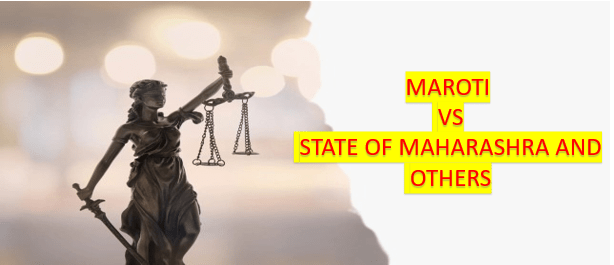
CASE ANALYSIS OF MAROTI VS STATE OF MAHARASHRA AND OTHERS
| Case Name: | Maroti verus State of Maharashtra and Others |
| Equivalent Citation: | 2015 SCC OnLine Bom 3415 |
| Date of Judgement: | February 4, 2015 |
| Court: | High Court of Bombay |
| Case No. : | Criminal Revision Application No. 205/2002 |
| Case Type: | Revision Application (Criminal) |
| Applicant: | Maroti |
| Respondents: | State of Maharashtra and Others |
| Bench: | Single Judge Bench (Hon’ble Justice V. M. Deshpande) |
| Laws applied: | The Code of Criminal Procedure, 1973- Sections 169 and 173 |
Facts of the case
The applicant, who was the first original informant, registered FIR No. 159/2000. On June 24, 2002, Learned Judicial Magistrate First Class, Kandhar passed an order discharging the accused persons, who were named in the said FIR. The applicant/original first informant filed this application to question the correctness of the order passed by the JMIC, Kandhar.
Issues Raised
Whether the first informant is entitled to be heard by the learned magistrate before he accepts the report submitted by the investigating officer in respect of his action taken under Section 169 of the CRPC?
Contention of the Applicant
The applicant’s principle argument is that, being the first original informant, he was not given the opportunity to be heard. The counsel further contended that no prior notice was given by the magistrate to the applicant, and without hearing him, the report filed by the investigating officer under Section 169 was accepted. In support of the submissions, the counsel relied upon the decision of Bhagwant Singh v. Commissioner of Police (1985).
Judgement
The order passed by the learned Judicial Magistrate First Class, Kandhar district, Nanded, dated June 24, 2002, was set aside. The matter was remanded back to the magistrate, and the judge directed the magistrate to take a decision after giving notice and hearing to the first informant.
Rationale
The court noted that a plain reading of Section 169 reveals that the report submitted by the investigating officer under Section 169 is not actually a report but rather a report of his action taken therein.
While giving the decision, the court relied mainly upon two judgements, one passed by the Gujarat High Court in Natvarlal Ambalal Patel v. State of Gujarat and the other decided by the Supreme Court in Minu Kumari v. State of Bihar (2006). In the latter, the court observed that the informant is not affected when the magistrate takes cognizance and proceeds with the case. But if the magistrate decides to discharge the accused, the informant would certainly be prejudiced as the first information report lodged becomes wholly or partially infective.
Further, in the Minu Kumari case, the court realised in the Bhagwant Singh case that when the magistrate decides to drop proceedings against accused persons mentioned in the FIR, notice to the informant and the grant of an opportunity to be heard in the matter become mandatory.
Relying on these judgements, the judge opined that it is mandatory on the part of the magistrate to hear the first informant before accepting the discharge as submitted by the investigating officer under Section 169.
Conclusion
The court upheld the fundamentals of natural justice in this decision. One of the most fundamental human rights that every man is entitled to is the opportunity to be heard. By releasing the accused in lieu of the report provided by the investigating officer without listening to the first informant, the magistrate prejudiced the interests of the first informant. The ruling was persuasively backed by precedents set by the Supreme Court and other courts.
written by Charis Yadav, intern under legal vidhiya

![SEPCO Electric Power Construction Corporation Vs. Power Mech Projects Ltd. [August2021]](https://legalvidhiya.com/wp-content/uploads/2025/01/image-63-360x240.png)
![Union of India Vs. Association of Unified Telecom Service Providers of India [July 23, 2021]](https://legalvidhiya.com/wp-content/uploads/2025/01/image-62-360x240.png)
![Dr. Harish Kumar Khurana Vs. Joginder Singh [2021]](https://legalvidhiya.com/wp-content/uploads/2025/01/image-61-360x240.png)
0 Comments